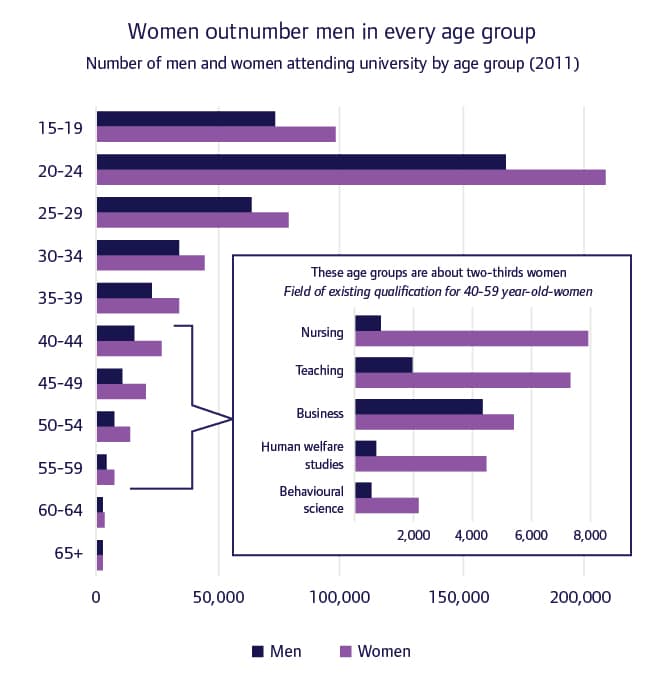Despite the numbers and percentage of women in the workforce continuing to grow, as well as increases in the percentage of women in middle management roles, the number of women enrolled in MBA programs has failed to keep pace with male enrolments.
MBA degree enrolments are 30-35 per cent female, despite increases in the number of women completing postgraduate studies. According to the 2012 Australian National Census, 46 per cent of women hold postgraduate degrees in 2011, up from 39 per cent in 2001. Significantly, in Australian universities women outnumber men completing study in every age group (Figure 1).
This is not an Australian problem – it’s a global issue. There is not one school in the Financial Times Rankings of Top 100 business schools consistently reporting gender balance in their MBA programs (Smyth, Financial Times, April 2014).
Throughout 2014, I worked with a research team to interview over 40 women who have completed their MBA or who have contemplated or taken a lengthy break (stopped or dropped out) from MBA study.
I also interviewed their male counterparts, to identify the deterrents, barriers, challenges, motivators and aids for women contemplating or having successfully graduated from MBA study.
The resulting study found that there are several potential causes of the MBA gender gap:
- A view that the program itself is too competitive/ masculine
- MBAs are not as strongly associated with career success by women
- Work-life conflict issues are greater for women
- Lack of female mentors or role models in business
- Persistence of a gender gap in salary for male and female MBA graduates, which limits the returns on human capital, financial and time investment made.
It found that the constraints women face in completing an MBA relates to the broader conflicts women face in terms of managing their often multiple roles as the primary caregiver and CEO of the household. They take on a disproportionate share of the domestic labour (even if they are the main breadwinner) as well as a paid work load. Women are also greatly impacted by the ‘glass ceiling’ which limits their career progression and earnings potential post-MBA.
Not surprisingly, the female respondents overwhelmingly cited time and money as their two primary deterrents to MBA study, with flexibility the most commonly offered solution. However, when asked if they would undertake MBA study if their employer told them they had leadership potential – the common response was an enthusiastic yes, absolutely.
Women see the time and money invested in themselves and an MBA education as a ‘sacrifice’ of time with their families and loved ones. Women also seemed to associate study time as ‘me time’ whereas men associated it so closely with career advancement that they saw it as necessary ‘work time’.
Women are also seeking a faster and more immediate return on the $70,000 (average cost of an Australian MBA) invested in their education, as well as on the time invested. The fact that they see very few women above them in the senior ranks of their organization means they are skeptical about how realistic the ROI will be for them.
The research found that the primary way to provide women with a return on their investment post-MBA is by linking their MBA study with a leadership or career development pathway in the workplace. Further, the workplace needs to provide support by offering flexible hours and peer support for time off and study.
To facilitate workplaces in doing this and based on the findings of this research, MGSM has developed and implemented the Women in MBA program (WiMBA) which encourages diversity in leadership by partnering with corporate and government organisations to identify their top female employees and support them through an MBA.
Five of Australia’s leading business schools have now joined the WiMBA program in a landmark partnership agreement designed to tackle the gender imbalance in MBA study.
The network of schools is committed to raising almost $20 million (in university and industry funds) to attract 320 new women into MBA programs over the next three years. Curtin University, the University of South Australia, Monash Business School and Sydney Business School have combined with the Macquarie Graduate School of Management (MGSM) to deliver their Women in MBA program (WiMBA).
This WiMBA Network will make the WiMBA program available to women in South Australia, Wollongong, Melbourne, Sydney and Western Australia for the first time.
Key Elements of the Program
It is driven by an internal sponsor – a key employee of the corporate partner – who develops a process to determine WiMBA candidates on the basis that they are potential future leaders of the company. Support from the employer takes three forms:
Financial: The WiMBA initiative offers scholarships to women to complete their MBA in a partnership with their employer. The network will match the contribution of the corporate partner dollar for dollar (up to 50 per cent). In order to qualify, the corporate partner must contribute a minimum of 15 per cent of the tuition fee per nominated recipient. Over the next three years, the network has committed to setting aside $8.55 million in fee waivers. Matched to industry funds, this raises a total of $17.1 million to attract 320 new women into MBA programs. On-the-ground: The employer will provide logistical and practical support to enable the recipient to attend class, undertake additional study and group work, and complete assignments.
Guidance and advice: The employer will pair recipients with in-house mentors/sponsors to provide them with guidance, support and advice throughout their MBA program and to help them develop a post-MBA career pathway. A MBA has a significant impact on career pathways and is particularly acute in driving middle-managers towards executive roles. The network aims to address the inequality at MBA enrolment level and impact the numbers of women working in senior management, executive ranks and on the boards of our leading companies.
More information visit mgsm.edu.au/WiMBa











